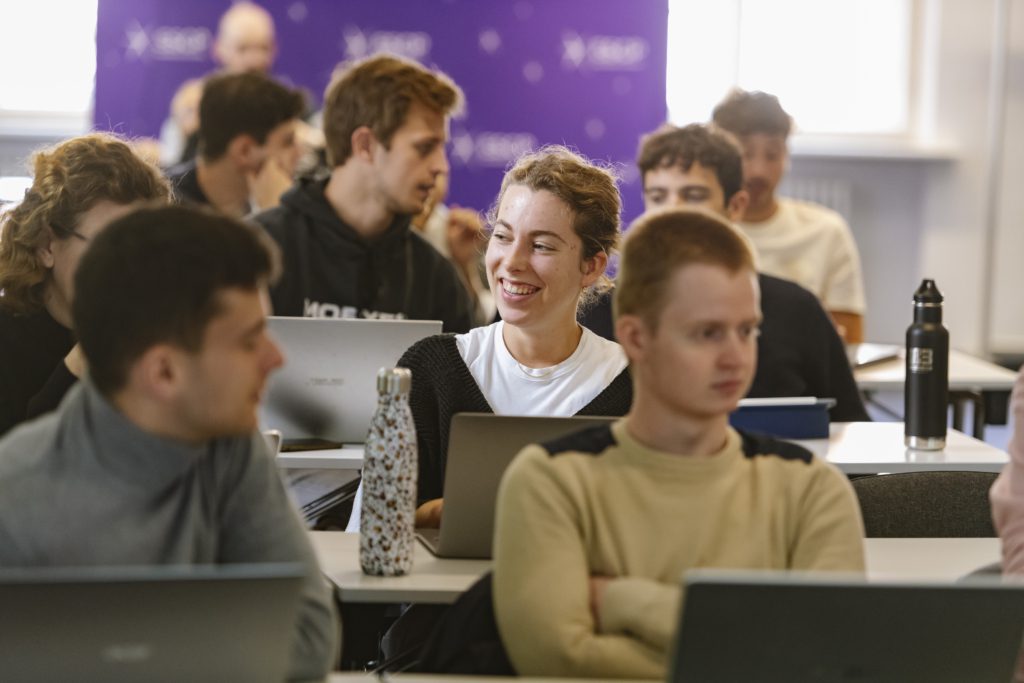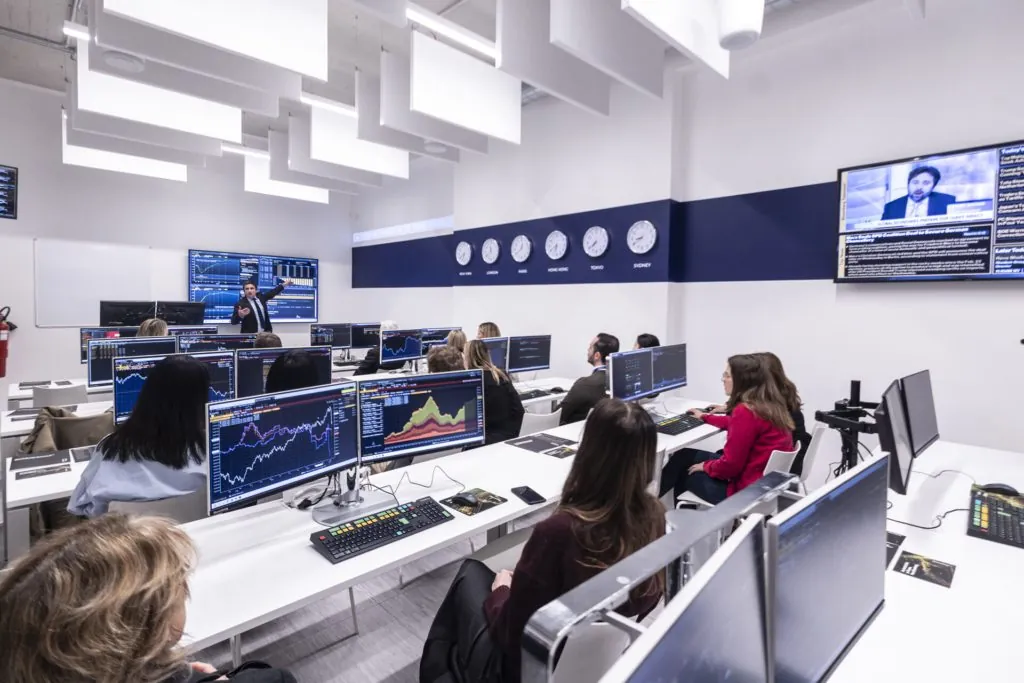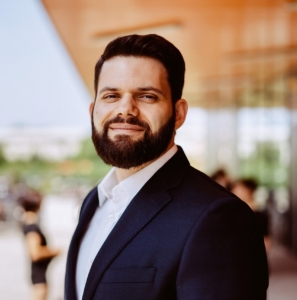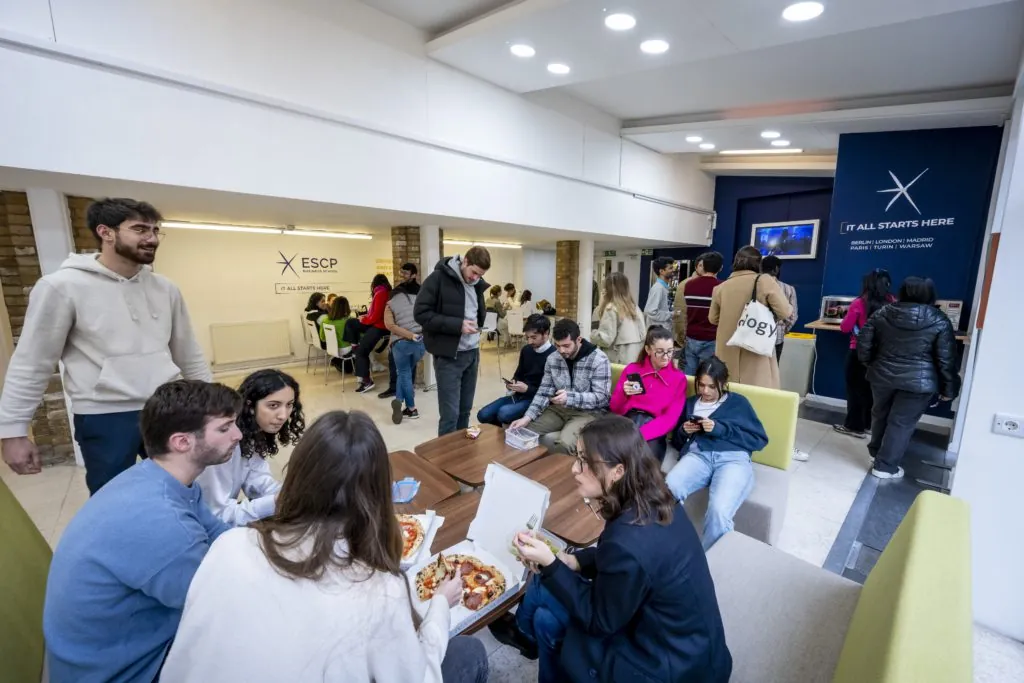
Shop Circle cofounders Gian Maria Gramondi and Luca Cartechini. ‘“I truly believe ESCP is one of the best business schools globally. If I could go back, I’d choose it all over again, and I never hesitate to recommend it,’ Cartechini says.
To understand the DNA of ESCP Business School, consider Shop Circle.
Co-founders Luca Cartechini and Gian Maria Gramondi met 12 years ago on their first day in ESCP’s Master in Management program, connecting through a shared interest in tech and entrepreneurship.
They studied at several of ESCP European campuses as part of the MIM, building local networks while learning the unwritten rules of doing business in different cities. ESCP’s entrepreneurial hub, Blue Factory, taught them to think ambitiously and to experiment. Through ESCP’s industry partners and its faculty, they met mentors and future investors.
Some of Shop Circle‘s earliest hires came from ESCP. Today, it is one of Europe’s fastest-growing software companies serving 150,000 customers. It acquires “exceptional but often overlooked” SaaS products and gives them the capital, resources, and AI infrastructure to scale worldwide. The company has raised more than $150 million since its founding in 2021, and employs nearly 300 people at its hubs in London, Milan, and Sarajevo.
“For me, the practical exposure (at ESCP) was one of the most valuable aspects,” says Gramondi, co-founder and COO. “From case studies and projects with companies to the ability to work across different campuses, ESCP gave us the chance to apply theory in real-world contexts, a mindset that has stayed with me ever since.”
Cartechini, Shop Circle CEO, agrees. “I truly believe ESCP is one of the best business schools globally. If I could go back, I’d choose it all over again, and I never hesitate to recommend it.”

ESCP’s 2024 Master in Management Graduation Ceremony. For its pioneering multi-campus model, its emphasis on technology and sustainable entrepreneurship, and its transformative vision for the future, ESCP is Poets&Quants’ 2025 Business School of the Year.
P&Q BUSINESS SCHOOL OF THE YEAR: ESCP
The entrepreneurial mindset that drives alumni like Cartechini and Gramondi (named to Forbes’ 30 Under 30 list in 2022) also fuels a new phase of evolution unfolding at ESCP Business School. In June, the school unveiled its sweeping new strategic plan called “Bold & United,” a title that actually sounds like an understatement.
Founded in 1819, ESCP bills itself as the world’s first business school. For much of its history, it was an elite and selective French grande école as well as one of the “trois Parisiennes” of elite business schools alongside HEC Paris and ESSEC Business School.
In 1974, it began a decades-long transformation into a trans-European business school by opening a campus in London, its first campus outside France. Campuses in Germany, Spain, and Italy followed with a sixth campus in Poland opening in 2015. This unique multi-campus model not only allows students to live and study in several countries during their programs, it requires it.
Bold & United will shift this transformation into overdrive, completely re-organizing ESCP into a new university: The European University of Management. By 2030, the university will include three schools: the business school at its academic heart, the ESCP School of Technology opening by 2027, and the ESCP School of Governance by 2029.

Léon Laulusa, executive president and dean of ESCP Business School
At a time when many U.S. business schools are planning for a coming “demographic cliff” with fewer college-aged students to fill their classes, ESCP plans to enroll 1,000 more students to its business programs by 2030 (bringing the total to around 12,000, or a 6% increase). It also plans to recruit about 1,000 new technology and 300 new governance students. That means hiring about 70 new faculty members for these schools, while simultaneously increasing its business faculty.
The plan also includes a €320 million investment in ESCP’s campuses, with €150 million earmarked for the historic Paris République site. Plan benchmarks include generating €300 in annual revenue and ranking in the top 5 in the Financial Times’ European Business School ranking. (The school finished 5th in 2024’s ranking, while its MIM ranked fifth in Europe and its executive MBA ranked first that same year.)
Talking to alumni and corporate partners, executive president and dean Léon Laulusa describes an almost audacious vision for the university with the technology school as a “French MIT” and the governance school as Europe’s version of Harvard’s Kennedy School. The reaction from his audience is immediate.
“I’ve received feedback from all over the world, with alumni sending messages to me personally to say how proud they are of ESCP. They see this as a very bold move. We dared to take this step, and that’s why I like to use the word ‘Audacity,’” says Laulusa.
“I think it’s because we both fit the context of today’s world and anticipate what the future will be. We are preparing the world of tomorrow, not just by teaching skills and competencies, but also by shaping attitudes and values.”
For its pioneering multi-campus model, its emphasis on technology and sustainable entrepreneurship, and its transformative vision for the future, ESCP is Poets&Quants’ 2025 Business School of the Year.

Students in class on ESCP’s Berlin Campus. For each program, students are required to study at several of ESCP’s campuses in Paris, London, Berlin, Madrid, Turin, and Warsaw.
LIVE IN 4 CITIES IN 2 YEARS
ESCP is already one of Europe’s most international business schools, and Bold & United aims to enroll students from 150-plus different nationalities. That includes more North American students like Lauren Wilkins. Born and raised in Sacramento, she studied international relations with a minor in Spanish at the University of Alabama.
Now a second year Master in Management student at ESCP, her American friends and colleagues are always surprised to learn that she will study in three different European cities during her degree and live in four cities total, including her internship.
“For me, what really makes ESCP stand out is that it doesn’t feel like a traditional business school. The multi-campus model and the mix of nationalities in every classroom mean you’re always adapting, learning from new perspectives, and approaching problems in different ways. The education feels alive in that sense,” says Wilkins.
“I’ve grown the most by living in new places, working across cultures, and actually trying my hand at different roles and challenges through my courses.”
That international experience is central to ESCP’s programs. ESCP has 150 academic partners in 50 countries, including Columbia, NYU, Duke, MIT, HKUST in Hong Kong, and CEIBS in China. In fact, it just launched the ESCP-CEIBS Global Master in Management, a fast-track dual degree over 14 months with sections in Shanghai, Paris, London, and Zurich.
The alumni network counts more than 85,000 graduates across 198 countries. For each program, students are required to study at several of ESCP’s campuses in Paris, London, Berlin, Madrid, Turin, and Warsaw.
Students of its three-year Bachelor in Management (BSc), which turns 10 this year, spend each year in a different country. The program has grown from fewer than 50 students to more than 3,000 undergraduates from over 100 nationalities. MIM students choose between two and five campuses while MBAs rotate through a different campus each term, studying in up to three countries depending on program length. Each campus is recognized by the host country to award local degrees, allowing international students to work there without employer sponsorship. Last year, ESCP became the first school outside the UK authorized to grant British degrees.

The trading rooms at ESCP’s Turin campus. The campus’ strengths in finance, luxury, digital transformation, and food have grown out of the Turin’s economy and history.
Local culture and industry shape each campus identity. Take Turin, Italy, for an example. Founded in 2004, it’s the fastest-growing ESCP campus, doubling students (from 600 to 1,200) and faculty (from 9 to 20) since 2022. Its strengths in finance, luxury, digital transformation, and food have grown out of the city’s economy and history.
Its MSc in International Food & Beverage Management, now 10 years old, taps into Turin’s rich gastronomic heritage. In 2023, the school opened Italy’s second high-tech trading room, blending finance with technology training.
Once Italy’s industrial capital, Turin is now a hub for advanced industries – including a growing aerospace cluster that includes Thales Alenia Space, Argotec, and startups supplying software to SpaceX. The campus is launching an MIM specialization in the space economy, expected to grow into a full master’s program, in partnership with the Polytechnic of Torino, one of Europe’s top engineering universities.
“ESCP is not one central hub with satellite campuses where students are simply sent for a semester or two. Those places don’t have the same DNA, connection, or roots. Here, it’s really a multi-campus model, and every campus has its own life, dean, culture, and specificity.” says Turin dean Alberta di Giuli.

Last year, the Turin Campus opened a new 8,000-square meter building in the city’s heart.
She emphasizes ESCP’s deep connection to local companies when developing new programs. At the Turin campus, they are working to create an advisory board for every program, asking companies directly: What kind of student profile are you looking for, what skills and values do you expect?
“These two things – the deep campus identities and the strong integration with companies – make ESCP very different from other schools.”
BUILDING A ‘FRENCH MIT IN REVERSE’
ESCPs was an early adopter of AI and other tech, and it continues to experiment.
This summer, it announced a major partnership with Hugging Face, founded by ESCP alum Clément Delangue. The open-source AI platform hosts thousands of models and tools for building and sharing artificial intelligence applications, and is behind some of the world’s most advanced AI models. The deal gives every student, faculty, and staff free access to Hugging Face’s Academia Hub, letting them not only learn AI, but build with it.
Last year, it was one of the first business schools to develop a proof-of-concept with OpenAI’s ChatGPT Edu. A thousand students, faculty, and staff tested how large language models could enhance teaching, research, and daily operations. The pilot generated more than 200 campus projects including AI tutors, negotiation simulations with AI “clients,” and automation tools that streamlined thousands of internship agreements. The school has since distributed more than 10,000 ChatGPT Edu licenses across its six campuses.
It is all part of a deliberate strategy to create a living lab of generative AI in management education. The school now requires all students to take a course on generative AI in business, emphasizing both ethical and practical uses. Faculty are rethinking teaching and assessment, and every program is being reviewed to reflect how AI is reshaping work and learning.
Louis-David Benyayer, ESCP’s AI Initiatives Coordinator and Associate Professor of Strategy, calls the school’s approach “embracing ambivalence.” Technology itself isn’t good or bad, it’s how people use it.
“On the one hand, we want to keep a close connection with the technologies, having our students use the technology and not only analyze its impact,” he says.
“On the other hand, we want to equip our students with the necessary skills made more important in a world where AI is abundant: critical thinking, creativity, complex problem solving, emotional intelligence, and leadership.”
This mindset underpins ESCP’s forthcoming School of Technology, a cornerstone of its European University of Management plan. The school will teach advanced technical skills like math, physics, and coding through a business lens. A cybersecurity course, for example, will move beyond encryption theory to explore how cyberattacks can disrupt companies, governments, and economies. Students will also be able to pursue dual degrees, combining technical and managerial training for hybrid roles in emerging industries.
Unlike a traditional engineering school, ESCP’s model focuses on what Laulusa calls the “ABCDs” of emerging tech: AI, Blockchain and big data, coding and cybersecurity, and digital tools.
“We’re inspired by MIT, but in reverse,” Laulusa says. “Instead of a tech school adding management, we are a management school adding tech.”

The incoming cohort of the Master in Management during their Induction Days ceremony.
ON PROFIT & PURPOSE
Beneath ESCP’s Bold & United strategy lies a simple idea: profit and purpose must go hand in hand. Sustainability has been part of ESCP’s DNA for more than 30 years. The school launched Europe’s first sustainability-focused course in 1992 and, in 2019, named Professor Gorgi Krlev its first Associate Dean of Sustainability. Today, its Sustainability Department has more than 25 professors, two research institutes (RESET and the Sustainability Institute), and an international advisory council bringing together voices from climate science, activism, business, finance, policy, and civil society.
Research covers topics such as the circular economy, sustainable supply chains, responsible innovation, sustainable business models, and social entrepreneurship. Sustainability is embedded across all programs, from Bachelor to Executive MBA, and in hands-on experiences like the Art Thinking seminar, Design Fiction for Sustainable Futures workshops, an open-source platform on innovation and entrepreneurship called TRANSFORM, and student-led Green Hackathons that prototype real-world solutions.

Gorgi Krlev, ESCP Associate Dean of Sustainability
“Sustainability is not a cost, but an investment,” Krlev told Poets&Quants. “Sustainability is not holding organizations back, it is a strategic advantage.”
Nowhere is this “profit with purpose” ethos more visible than in the Blue Factory, ESCP’s startup incubator. Launched in Paris in 2009 and expanded across all six campuses in 2025, the Blue Factory has helped more than 1,200 entrepreneurs and trained thousands of students in venture creation. Alumni include Hugging Face, Dashlane, and Circul’egg, ventures that reflect ESCP’s conviction that innovation must serve people as well as markets.
This commitment has earned ESCP recognition well before being named our Business School of the Year. It ranks second in France in ChangeNOW’s sustainability ranking and regularly appears among the top 10 globally for ESG and Net Zero teaching in the Financial Times. In 2023, Krlev was named one of P&Q’s 40 Best MBA Professors Under 40 for his holistic approach to the subject. Each ranking and award validates ESCP’s belief that sustainability is a long-term commitment to both its students and to society.
“Sustainability challenges are irreversible forces that are reshaping the world in profound ways. Our response needs to be on par,” he tells P&Q.
“Our role as a business school is to ensure that future leaders are fully equipped to navigate and drive the necessary transitions, which will be required, regardless of the sector or industry they join.”

Students in the student lounge and cafe on ESCP’s London campus. Alumni are giving real money to ESCP’s Foundation which has raised €44 million on a €100 million goal to support Bold & United.
WAKING A ‘SLEEPING BEAUTY’
When ESCP was named Business School of the Year, few celebrated harder than its alumni. Their support has surged in recent years — evident in record fundraising and a foundation now powering the school’s transformation with serious money.
While American business schools are used to naming rights and multimillion-dollar gifts, that culture of philanthropy is still emerging in Europe. ESCP is helping define it.
“This is still relatively new for us,” says Brynhild Dumas, Executive Director of the ESCP Foundation. “However, in recent years, it feels like the school is really transforming, and we’re seeing a real cultural shift. As the school grows more visible and ambitious, alumni feel renewed pride and want to contribute financially as well.”
Founded in 2012 under the joint patronage of ESCP and its alumni association, the Foundation was created to channel alumni and corporate support into the school’s long-term vision. In its early years, it raised just €1 to €2 million annually. Then came ESCP’s 200th anniversary in 2019 along with its first €1-million pledge, a sign that donors were beginning to believe in the school’s global potential.
Earlier this year, it launched its first full-fledged fundraising campaign, “Rising Together,” with a €100 million goal to support Bold & United. It has already secured more than €44 million in donations and pledges.
The effort is also intentionally global. During the 50th anniversary celebration of EAP – the milestone that anchored ESCP’s European presence in Berlin, Madrid, and London – the Foundation reconnected with its German alumni community, raising more than €400,000. In Italy, family businesses with deep alumni roots have stepped up. And at a gala in New York earlier this year, U.S. alumni contributed more than €500,000 and pledged continued support.
Dumas says a recognition like Business School of the Year validates the trust alumni and corporate partners have placed in ESCP.
“It’s a culmination of ESCP’s ambition and transformation. This recognition shows that we are no longer just a French grande école but a truly international, European business school that has embraced its unique DNA,” she says.
“Alumni see a school transformed – a ‘sleeping beauty’ that has become a dynamic European leader – and they want to be part of that journey.”
DON’T MISS: ESCP’S DEAN ON THE FRENCH B-SCHOOL’S UNIQUE VALUE PROPOSITION and ESCP’S NEW STRATEGIC PLAN: A ‘THIRD WAY’ BETWEEN U.S. & CHINA IN BUSINESS EDUCATION
The post Waking A ‘Sleeping Beauty’: Poets&Quants Names ESCP Its 2025 Business School Of The Year appeared first on Poets&Quants.
